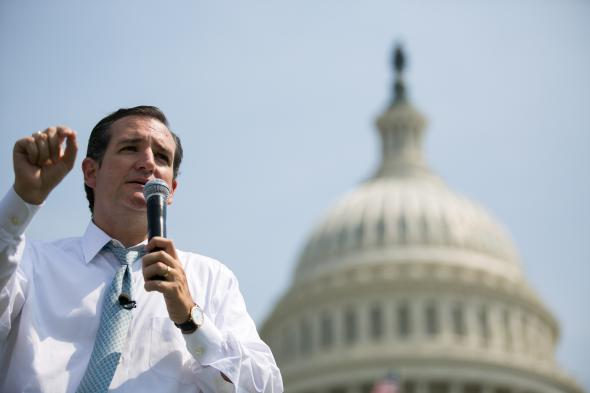On Friday, the U.S. House of Representatives voted 230 to 189 to fund the government for the rest of the year only if the Affordable Care Act, a.k.a. Obamacare, doesn’t get a cent. Essentially, the resolution tells the Senate and President Obama: Accept our demand to gut Obamacare, or the government shuts down.
For those of you doing the math at home, 230 ayes on the roll call means that 53 percent of House members voted for the ultimatum. Republicans pushed it through on a party-line vote. As Slate’s David Weigel points out, Democrats voted against it, 188 to 2.
Sen. Ted Cruz, R-Texas, congratulated his House colleagues on forcing the resolution through. “Today was a victory for House conservatives,” Cruz declared on Fox News. “It was a victory for House leadership, for Speaker Boehner.” After asserting, without apparent irony, that the vote was “bipartisan,” Cruz called on “Senate Republicans to come together and to support House Republicans.” In a press release, Cruz exhorted his colleagues: “Now is a time for party unity; Senate Republicans should stand side-by-side with courageous House Republicans.”
That was Friday. On Sunday, Cruz reappeared on Fox with a different message. In the Senate, he told Chris Wallace, “The first order of business is going to be to ask Harry Reid if he will agree to allow amendments to be subject to a 60-vote threshold. And that’s typical in the Senate.” By requiring 60 votes, the GOP could prevent the Senate’s Democratic majority from amending the resolution to fund the entire government, including Obamacare.
Cruz lamented that Reid would probably reject this procedural ploy, “because he wants to use brute political power to force Obamacare funding through with just Democrats.” In that case, Cruz concluded, “the majority leader is abusing his power,” and Republicans should filibuster the resolution.
Wallace was puzzled. “You say this is brute political power,” he told Cruz. “It’s Senate Rule 22, which has been around for years. It says you allow debate, after you take cloture, that you can pass an amendment by a simple majority. That’s the rule.”
Cruz was unmoved. “What’s good for the goose, it’s good for the gander,” he replied. “You’re right, that is one rule. But there is another rule that says it takes 60 votes to get cloture. And that’s the reason the Senate generally, on controversial votes, we work out an agreement for it to be subject to a 60-vote threshold.” That way, “if the majority is going to run the minority over with a train, the minority has the ability to stop them.”
So this is Cruz’s position: When Republicans ram an ultimatum through the House on a 53-percent party-line roll call, using the threat of a shutdown to gut a bill they lack the votes to repeal, that’s unity and courage. When Democrats threaten to use their 54-percent majority in the Senate to restore Obamacare to the resolution—which could then be voted up or down, or filibustered by the GOP—that’s abuse of power.
Every politician fibs now and then. Some do it better, more often, or more passionately than others. Even among the elite of his profession, Cruz stands out for the sincerity and deep feeling with which he can tell you one thing on Friday and the exact opposite on Sunday. He’s a national treasure. I can’t wait to see what he’ll say next.
